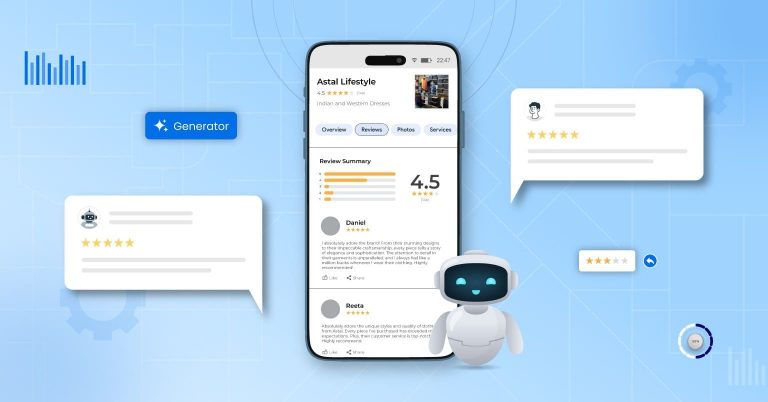You might have seen it happen. A location with decent foot traffic suddenly starts to decline.
Fewer check-ins. More cancellations. Then, the reviews begin to shift not just in star ratings, but in tone. These early signs, subtle as they may be, often signal the onset of more pertinent issues in the customer experience.
Reviews are not just a feedback tool. They are emotional barometers. And when studied through the lens of an AI review engine, they reveal actionable insights about customer expectations, business consistency, and service breakdowns.
Customer reviews may seem straightforward at first glance. But beyond the surface, they hold patterns of sentiment that reflect more than isolated incidents. Consider this review:
“Staff was polite, but I waited 20 minutes for coffee.”
This is not a complaint about rudeness. It is about operational inefficiency. While the tone is respectful, the underlying sentiment reflects disappointment. When this kind of feedback is repeated across multiple outlets, it becomes a trend. Not a one-off instance.
This is where platforms such as SingleInterface, with capabilities like the AI Review Responders, offer a real advantage.
These systems examine not only the text but also the tone and context of thousands of reviews simultaneously. They identify repeated themes, emotional triggers, and customer pain points that may otherwise be missed by manual checks.
These tools go beyond keyword matching. They help teams understand customer frustrations or praises at scale, flagging issues early and highlighting what needs attention. Whether it’s an AI review responder or a robust dashboard, the goal is to pick up on real sentiment and respond to negative feedback with empathy.
Related Read: Using AI to Analyze Sentiment Trends from Store-Level Customer Calls
Responding to customer reviews is now standard practice. However, how you respond can significantly impact how your brand is perceived by the masses.
If a brand opts for generic and canned responses, it rarely builds trust. But when automated responses reflect empathy and respond with relevance, they show customers that their concerns are truly understood.
Today’s AI review response systems can customize replies by assessing emotional tone. They generate messages that are empathetic, clear, and aligned with your voice. If the customer expresses anger, the tone is apologetic and solution-oriented. If the tone is neutral, the reply maintains a professional demeanor.
Brands can also configure tone presets—professional, friendly, and concise—based on their identity. This helps maintain consistency across all store responses.
This approach not only saves time but also builds trust. Customers are more likely to feel heard and valued when the response matches the emotion of their review.
Automated responses tailored to review sentiment are helping brands manage feedback more efficiently. Some businesses are already scaling this approach using structured templates and context-aware systems to adapt and streamline review response workflows using AI tools.

Star ratings offer limited information. A location with an average of 4.2 stars might seem fine. But what if recent reviews show a dip in satisfaction? What if the keywords linked to those ratings include terms like “slow,” “dirty,” or “unreliable”?
SingleInterface’s AI-led review analysis helps surface these hidden signals. By identifying patterns in language, it connects sentiment with specific business insights:
This level of mapping of emotions helps businesses act locally, not just centrally. It enables regional managers to focus their attention on areas where customer sentiment shows the most significant fluctuations.
Understanding emotion through AI review engines also helps pre-empt churn. When customers feel understood, they are less likely to leave, even after a poor experience. It becomes a subtle form of predictive analytics for business operations.
Related Read: Analyzing the Sentiments Expressed in Reviews
Capturing customer sentiment is just the first step. It becomes valuable only when followed by action.
Let’s say reviews from a particular city begin to reflect dissatisfaction around wait times. If the analysis shows these reviews increased after a new scheduling model was introduced, then that insight points to a straightforward operational fix.
Similarly, if another location consistently receives positive sentiment after extended hours were introduced, that success can be replicated elsewhere.
Review insights are a form of real-time market research. When used correctly, they help shape policies, training, and communication. The result is not only better service but also a stronger reputation.
Local marketing has always required relevance and speed. Emotional intelligence enhances both. It gives businesses the ability to sense what customers are experiencing at the moment and to respond with precision.
When reviews are taken seriously, and responses reflect understanding, it signals a brand that listens. This, more than ads or promotions, often builds long-term loyalty.
Moreover, in competitive local ecosystems, small changes can have significant impacts. A single point of friction removed, or a gesture of acknowledgment made visible in reviews can influence whether a customer returns.
Emotionally intelligent brands do not just aim for high ratings; they strive to create meaningful connections. They strive for resonance. And increasingly, that resonance is powered by predictive analytics for business tools that make acting on emotion both practical and scalable.
Most businesses track reviews and a very few turn them into a system for improvement. And even fewer use emotion to prioritize where and how to act.
Emotion-focused analysis can:
The goal is not perfection. It is a progression. To keep getting better at what matters most to the customer.
AI review systems make that progression possible without overwhelming local teams.
Review analysis has evolved far beyond tallying stars. It is now about understanding people—their concerns, preferences, and expectations.
AI makes this easier. But it is emotional intelligence—powered by technology and guided by human intent—that truly reshapes how local marketing works.
The shift is simple: listen carefully, understand deeply, and act meaningfully. That is what keeps customers coming back.
From the first review to the final customer action, every word matters.
If you’re looking to make review insights a more consistent part of your local decision-making, SingleInterface‘s AI-first capabilities can help you embed emotional intelligence directly into your everyday operations at scale.